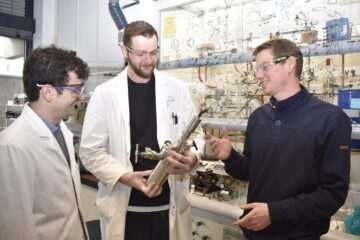Long-term effects of radiopharmaceuticals

Are there cancer cells in the thyroid? Have metastases detached themselves from a tumor and moved elsewhere in the body?
Diagnostic questions such as these can be answered by nuclear physicians using low-level, short-lived radioactive substances. These so-called radiopharmaceuticals spread throughout the organism in a unique fashion and accumulate in large numbers in cancer cells, for example. Their radioactive signal can be measured, thereby revealing the location of tumor cells.
Now in Europe for the first time the basic scientific principles for all permitted radiopharmaceuticals will be systematically presented and assessed – as part of the PEDDOSE.NET project. The European Commission is providing EUR 500,000 in funding.
Goals of the project
One of the goals is to describe current knowledge relating to any effects of low-level radioactive pharmaceuticals on health. The focus is on substances administered to children and young people for diagnostic purposes. Within the project, the scientists will collate and assess data on anticipated exposure to radiation and any associated risks. They then aim to recommend how these data should be collated in the development of new radiopharmaceuticals.
A further goal for PEDDOSE.NET is to devise recommendations and guidelines in order to drive scientific and technological innovations. For example, the scientists believe that it will be possible in future to administer radiopharmaceuticals in even smaller doses, thereby further reducing the hypothetical risk to patients.
Another of the project’s goals is to identify any areas in which further clinical studies may be required. On every issue the scientists will collaborate with the authorities responsible for approving new substances.
Results expected in fall 2011
It is expected that the project will be completed in fall 2011. Its results should further improve radiation protection for patients and make the use of nuclear-medical examinations even more targeted than it is now.
Partners involved in the project
Five partner institutes from four European countries are involved in PEDDOSE.NET; the scientific coordinator is Professor Michael Laßmann, chief physicist at the Department of Nuclear Medicine of the University of Würzburg.
The project is being coordinated by the European Institute for Biomedical Imaging Research (EIBIR) in Vienna. It has the support of the European Association of Nuclear Medicine (EANM). The project consortium is made up of members of the EANM Dosimetry Committee and experts from the German Federal Office for Radiation Protection.
Homepage of the PEDDOSE.NET project: http://www.peddose.net
Contact
Prof. Dr. Michael Laßmann, Department of Nuclear Medicine, University of Würzburg, T +49 (0)931 201-35500, lassmann@nuklearmedizin.uni-wuerzburg.de
Media Contact
All latest news from the category: Health and Medicine
This subject area encompasses research and studies in the field of human medicine.
Among the wide-ranging list of topics covered here are anesthesiology, anatomy, surgery, human genetics, hygiene and environmental medicine, internal medicine, neurology, pharmacology, physiology, urology and dental medicine.
Newest articles

Lower dose of mpox vaccine is safe
… and generates six-week antibody response equivalent to standard regimen. Study highlights need for defined markers of mpox immunity to inform public health use. A dose-sparing intradermal mpox vaccination regimen…

Efficient, sustainable and cost-effective hybrid energy storage system for modern power grids
EU project HyFlow: Over three years of research, the consortium of the EU project HyFlow has successfully developed a highly efficient, sustainable, and cost-effective hybrid energy storage system (HESS) that…

Safer alternative for an explosive reaction
The chemical industry has been using a reaction with explosive chemicals for over 100 years – now Mülheim scientists have discovered a safer alternative. The Ritter Group of the Max…





















